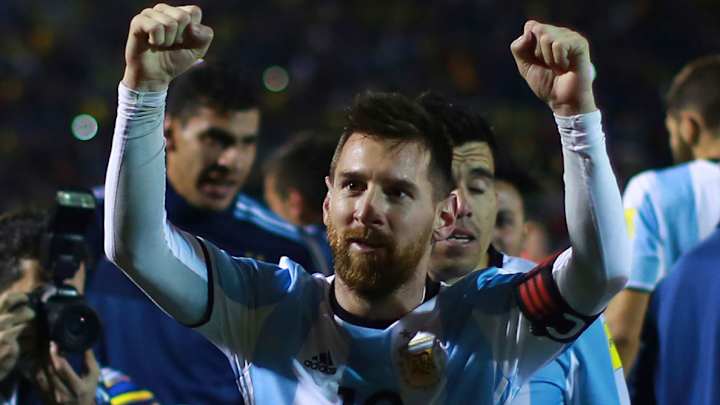Argentina Savior Messi Enforces His Brilliance When His Nation Needs Him Most

Twenty years ago, Lionel Messi, then a 10-year-old playing for a youth team at Newell’s Old Boys, headed into rural Santa Fe for a game against Pujato. These were always difficult, physical matches, and Messi took a kicking. Pujato scored twice early on and, as Newell’s defender Gerardo Grighini recalls, Newell’s was still 2-0 down when, with “eight or nine minutes to go” Messi “got the face on,” It was as though Messi had said to himself, “F*** it, I’ll sort it!” and he scored three goals in those closing minutes to win the game.
Messi has been getting the face on a lot recently. With Neymar gone, Ousmane Dembele injured and general chaos at the Camp Nou, it feels as though Barcelona’s perfect start to the season has been the result of him, fired by the “bronca” that used to motivate Diego Maradona, dragging Barcelona forward almost single-handed. And then, in Quito on Tuesday night, with Argentina 1-0 down after some 40 seconds and facing the possibility of missing a World Cup for the first time since 1970, he scored a hat trick.
“F*** it, I’ll sort it!”
“Bronca” is a favorite world of Maradona. It’s a term from lunfardo, the street slang of Buenos Aires that inverts the syllables of words. In this case, “cabron”–bastard–becomes a noun meaning the energy derived from anger or when provoked. Listen to Maradona and it comes to seem that every act of greatness he ever performed on a pitch was motivated by bronca–but then Maradona, a far more volatile, less consistent genius than Messi, was forever making points with his brilliance, as though no transcendent act could ever be wasted on something as straightforward as just winning a game or professionalism.
Messi’s excellence is relentless, so much so that there is a danger we have become inured to it and take it for granted. Then comes something like Tuesday, when he not merely wins a game, not merely scored three high-caliber goals, but needled by the inadequacy of those around him–players, coaches, directors or administrators–he grabs the mood of a game and forces it to go the way he wants it to.
Argentina had only ever won once in Quito. It had scored only twice in its previous five qualifiers: a penalty and an own-goal. In this most chaotic of qualifying campaigns, it had gone through 43 players, three managers and three federation presidents, including a FIFA normalization committee. Messi had retired, been injured and banned. There was a genuine possibility that Tuesday night might have been his last game for the national side, certainly his last World Cup-related game as the player he is now before age saps at his acceleration.
There was moaning and grumbling; without a World Cup title, it was said, he could never match Maradona’s legacy. Perhaps he can’t. In his turbulent personal life, in his look and manner, in his emergence from a villa miseria on the banks of the Riachuelo, Maradona was always something more than a footballer; he was the incarnation of the pibe ideal, almost as though his coming had been foretold.
Messi is just a brilliant footballer. His father was a factory manager and the fact that he grew up under the protection of Barcelona in a sense makes his story less dramatic, less operatic. In terms of trophies won, in terms of the number of staggering performances, he already far outstrips Maradona, whose career was always fragmented by injuries and indiscipline. It’s true his success has always been at a superclub, but that is the nature modern football and what, anyway, is he supposed to do? Should he leave Barcelona to join a smaller side just to make a point? Maradona also had his opportunity at Barcelona; the difference is he failed–admittedly when the club was run far worse than it is even today. Messi has already played in more international finals than Maradona, who rarely bothered with the Copa America; that he has won none of them says more about the finishing under pressure of Gonzalo Higuain than his own abilities.
That’s not to say that Messi is better than Maradona; it’s to point out that the arguments used in support of Maradona tend to be flawed. Comparisons across generations are nearly impossible. The game has changed and memories blur events. International football, with a limited number of fixtures, often hinges on the slightest events. Argentina’s qualification for the 1986 World Cup, Maradona and all, was secured only by an 81st-minute goal in their final qualifier from Ricardo Gareca, the present Peru manager. Had that not gone in, Argentina would have been forced into a four-team playoff for a single additional slot.
Plenty of champions have qualified poorly. The truest test of a champion, perhaps, is to do it when it really matters, to have that force of will to harness circumstance. A great player can, as Paulo Dybala acknowledged last week, be a problem, inhibiting others from playing their natural game–look at how Brazil has improved since it stopped being all about Neymar; look how Sweden has improved since Zlatan Ibrahimovic retired–but they also offer possibilities way beyond what can normally be conceived.
Narratives can make heroes and heroes can make narratives. For the true great, events often seem to fall into place. Argentina can now believe that Russia will be the fulfillment of Messi’s destiny, and that everything that has gone before was mere buildup. Without adversity, there can be no savior, and if Messi does go on to win the World Cup next summer, how much sweeter will it be if it is his last attempt? If he did, before Tuesday’s hat trick, teeter on the brink of failure before getting the face on and sorting it?

An accomplished author of multiple books, Jonathan Wilson is one of the world’s preeminent minds on soccer tactics and history.